Publications & resources
Below we list some of the key publications and resources from the RURU team at the University of St Andrews. For more RURU-related publications please visit the individual webpages of our members and affiliates
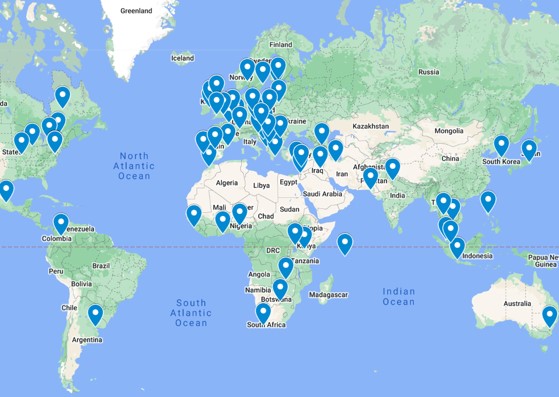
The Parliamentary Office of Science and Technology (POST) has launched a new, interactive map that highlights the variety of ways that parliaments around the world access academic research. The map is based on research that POST commissioned from RURU Director Vicky Ward and RURU Associate Mark Monaghan (Loughborough University). The map is being hosted by the International Parliamentary Engagement Network (IPEN) and can be found here.
The new map illustrates the variety and breadth of engagement with academic research in parliaments across the world, expanding current understanding of this activity and providing an opportunity for connections across parliaments. It highlights 73 research engagement services, each of which have provided, compiled, or produced academic research for parliamentary purposes within the past 5 years. Some of these, like the House of Commons Library, provide research for parliamentarians on request. Others provide direct links to the academic community, or produce peer-reviewed evidence briefings, reports and research reviews.
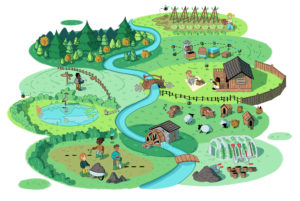 Ward, Vicky ; Tooman, Tricia ; Reid, Benet ; Davies, Huw ; Marshall, Martin (2021), Embedding researchers into organisations: a study of the features of embedded research initiatives, Evidence & Policy
Ward, Vicky ; Tooman, Tricia ; Reid, Benet ; Davies, Huw ; Marshall, Martin (2021), Embedding researchers into organisations: a study of the features of embedded research initiatives, Evidence & Policy
Ward, Vicky ; Tooman, Tricia ; Reid, Benet ; Davies, Huw ; O’ Brien, Breid ; Mear, Liz ; Marshall, Martin (2021), A framework to support the design and cultivation of embedded research initiatives, Evidence & Policy
We have recently published two papers as part of our work on the Embedded project (see projects page). One explores the nature and organisation of embedded research initiatives in health settings in the UK and identifies ten common features of such initiatives. The other presents these themes as a structured, multilayered framework to support those designing, analysing and managing embedded research initiatives. The framework is designed to support transparency, dialogue, agreement of expectations and ongoing learning within and between initiatives. The final report from the project is now available online here.
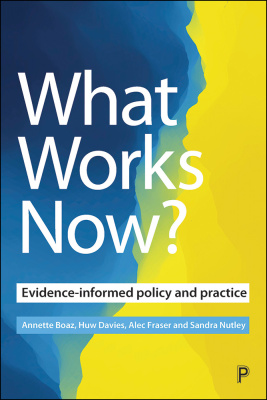 Boaz A, Davies HTO, Fraser A, Nutley SM (2019), What Works Now? Evidence-informed Policy and Practice, Bristol: Policy Press
Boaz A, Davies HTO, Fraser A, Nutley SM (2019), What Works Now? Evidence-informed Policy and Practice, Bristol: Policy Press
Edited by RURU co-director Huw Davies and former co-director Sandra Nutley with RURU friends and affiliates Annette Boaz (Kingston University and St George’s University of London) and Alec Fraser (London School of Hygiene & Tropical Medicine), this all-new text is a thorough revisiting of the arguments and debates laid out in the ground-breaking What Works? (2000; see below). At the core of the book lie three cross-cutting explorations of: how research-based knowledge is created; how such knowledge gets authenticated, labelled and vaunted in the context of other diverse sources of knowledge; and how such evidence is then co-opted for action in policy and practice. The overall aim of the book is the encouragement of situated understanding that can better enable effective actions in the creation, promotion and use of research-based knowledge.
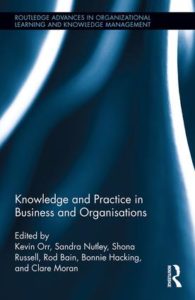 Orr, K, Nutley, S et al., (2016) Knowledge and Practice in Business and Organisations, Abingdon: Routledge
Orr, K, Nutley, S et al., (2016) Knowledge and Practice in Business and Organisations, Abingdon: Routledge
Several members of the RURU team contributed to this book which was produced by the Knowledge and Practice research group in the School of Management, University of St Andrews. A video slideshow which introduces the content of the book and the process by which it was produced can viewed on YouTube at ‘Introducing a new book…’(2:24).
See the chapter by Sandra Nutley and Huw Davies on creating sharing and using knowledge here (open access, pre-publication version pdf)
What counts as good evidence?
A two-part video was produced as a virtual keynote address for the Ontario Education Research Symposium, Canada (18-20 February, 2014). Sandra Nutley and Huw Davies were asked to talk about their provocation paper on ‘What counts as good evidence?’. The paper is available at www.alliance4usefulevidence.org/assets/What-Counts-as-Good-Evidence-WEB.pdf.
Sandra Nutley provides an overview of the main points addressed in the provocation paper in What Counts as Good Evidence? – Part 1 on YouTube (7:09).
Huw Davies and Sandra Nutley discuss some of the key issues raised by the provocation paper in What counts as good evidence? – Part 2 on YouTube (8:39).
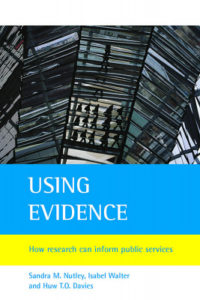
Nutley SM Walter I and Davies HTO (2007).
Using Evidence: How research can inform public services,
Bristol: Policy press.
This book draws together current knowledge about how research gets used and how this can be encouraged and improved.
“Anyone who has ever written or uttered the words ‘evidence-based policy’ should read this outstanding book. So should anyone else who has hopes for increasing the rationality of policy or practice through reference to systematic inquiry. The volume unpacks the meanings and assumption embedded in ‘evidence-based policy’, illustrates its successes and shortfalls, looks at alternative perspectives on the junction of research and practice, and suggests documented ways to improve the engagement of research with policy and practice. This sophisticated book will challenge some current beliefs and offer better grounded and more realistic aspirations.”
Carol H Weiss, Beatrice B Whiting Professor Emerita, Harvard Graduate School of Education, US
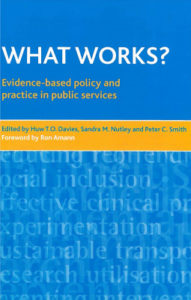
Davies HTO, Nutley SM and Smith PC (eds) (2000).
What Works? Evidence-based policy and practice in public services. Bristol: Policy Press.
This book provides accounts of the role of evidence in eight specific public policy areas, using experts in each field to explore the creation, dissemination and use of evidence within each.
“If anything is going to turn policy makers into ‘smart users’ of research evidence it is this book. It uncovers the difficult questions behind the commitment of ‘evidence-based policy’…”
Graham Leicester, then Director of Scottish Council Foundation.
“Evidence-based policy is a key component of the government’s modernisation agenda, and this book helpfully dissects what it means… There is a compelling call for a more eclectic and pluralist, while rigorous, approach to what constitutes ‘evidence’ which should be heard by policy makers and researchers alike.”
Professor Sue Richards, then at University of Birmingham.